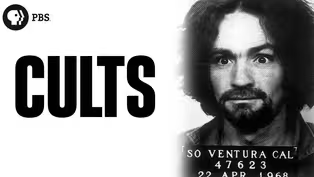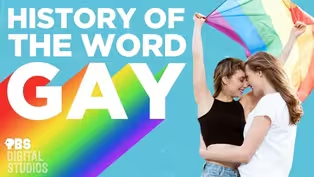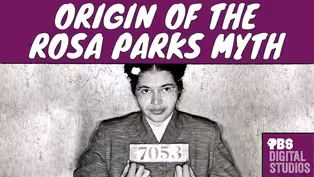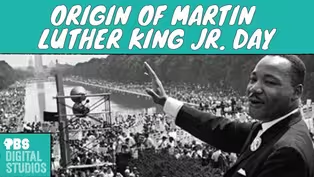
Why are 18 Year Olds Considered Adults?
Season 1 Episode 3 | 6m 50sVideo has Closed Captions
Why are 18 Year Olds Considered Adults?
While you might not personally consider your average 18 year old a full-fledged adult, 18 is a pretty magic number in the US. It’s the the age when you can vote, go to war, work full time, and move out of their parents house. Why is this the case? Well while you might think there’s some sort of biological or traditional explanation, that’s not the case.
Problems playing video? | Closed Captioning Feedback
Problems playing video? | Closed Captioning Feedback

Why are 18 Year Olds Considered Adults?
Season 1 Episode 3 | 6m 50sVideo has Closed Captions
While you might not personally consider your average 18 year old a full-fledged adult, 18 is a pretty magic number in the US. It’s the the age when you can vote, go to war, work full time, and move out of their parents house. Why is this the case? Well while you might think there’s some sort of biological or traditional explanation, that’s not the case.
Problems playing video? | Closed Captioning Feedback
How to Watch Origin of Everything
Origin of Everything is available to stream on pbs.org and the free PBS App, available on iPhone, Apple TV, Android TV, Android smartphones, Amazon Fire TV, Amazon Fire Tablet, Roku, Samsung Smart TV, and Vizio.
Providing Support for PBS.org
Learn Moreabout PBS online sponsorshipMore from This Collection
Origin of Everything explains topics that defined the 1960s
Why Are We Obsessed with Cults?
Video has Closed Captions
What is it about cults that captures the public imagination? (10m 52s)
Video has Closed Captions
Why did “GAY” stop meaning “happy” and start referring “same sex relationships? (6m 3s)
Video has Closed Captions
So why do we all know a misleading story about Rosa Parks? (8m 14s)
How Did Martin Luther King Jr. Get a Holiday?
Video has Closed Captions
Did you know Martin Luther King Jr Day wasn’t celebrated in all 50 states until 2000? (9m 40s)
Providing Support for PBS.org
Learn Moreabout PBS online sponsorship[intriguing music] In the U.S., turning 18 is arguably the most important age in our lives, both culturally and legally, but have you ever wondered: Why is 18 considered an adult?
[upbeat music] So, around the world, 18 is a momentous age, and the U.S. is no exception.
At 18, U.S. teenagers can vote, enlist in the army, work full-time, sign contracts, buy tobacco, and move out of their parents' house.
But, even though we think of 18 as the magic number when kids suddenly grow up, how did we settle on this age as opposed to others?
You might think it's because of some sort of physiological explanation.
Well, kind of, but not really.
While most people are done with puberty by 18, many people are not.
Plus, recent studies have found that people's brains are still growing and maturing until age 25.
And let's face it-- people who can't rent a car don't always make the most adult decisions.
Another easy explanation could be that 18 is considered an adult because of longstanding tradition, but that's also not really true.
In fact, 18 as the legal nationwide voting age wasn't enshrined in the U.S. Constitution until 1971, and until World War II, the draft age was 21.
Additionally, outside of the U.S., coming-of-age ceremonies vary pretty considerably on the official age of adulthood.
So how did we arrive at 18?
Well, to answer the question of how and when we started thinking of people as adults, we actually need to reverse our thinking and ask, "How did the concept of a childhood emerge "and shift from a mere fact of life to a whole category of people that need special rules?"
At the beginning of the 16th century, kids as young as seven were expected to work and were often being prepared for adult labor.
However, most of this work took place either within the home as agricultural labor or during apprenticeships where kids learned a trade.
The shift of kids to a protected class really kicks off during the Industrial Revolution.
It wasn't that children were necessarily working in greater numbers, but rather that the rapid spread of industrialization altered the quality, duration, and danger of child labor.
In the 18th century and going into the 19th century, poor children were working in factories outside of their home and without parental supervision.
They were also working for more hours without the seasonal breaks that were sometimes a part of farm labor.
Plus, they were working at overcrowded factories that had poor living conditions, unsafe practices, and very low wages.
Yeah, so, not so great to be a kid.
By the early to mid-19th century, we see more and more activists across Europe and the U.S. increase their efforts to protest and save children from the horrors of abuse and poverty.
This is mirrored in the rise of novels about scrappy young orphans with soot-covered faces, like "Oliver Twist," "Great Expectations," and "Les Mis."
And shout-out to the surprisingly accurate American Girl doll, Samantha.
In the 18th and 19th century, we see an increase in the spread of education for young boys, not just the wealthy.
And by the early 20th century, we start to get laws in Europe and the U.S. making schooling mandatory up to certain ages, like 16, or-- you guessed it-- 18.
In 1938, Congress passed the Fair Labor Standards Act, which set the minimum work age at 16 during the school year, 14 for afterschool jobs, and 18 for dangerous jobs.
So, the 19th and 20th centuries were big turning points for the concept of kids just being kids.
But it's important to note these 19th century evolutions weren't extended to all children.
Scholar Robin Bernstein notes in her work, "Racial Innocence," that Harriet Beecher Stowe's 1852 abolitionist novel, "Uncle Tom's Cabin," presents us with two child characters, Eva and Topsy.
White Eva is represented as having the pure-hearted innocence of childhood, while black Topsy is represented as an out-of-control child who has been corrupted into bad behavior because of the evils of slavery.
So it's Topsy's link to the forced labor and attendant ills of slavery that corrupts her in Stowe's abolitionist novel, requiring that she be saved and educated, both formally and through her proximity to Eva.
"Uncle Tom's Cabin" is also a contemporary of 19th-century debates on child labor for European and white American children.
Yet, false arguments that represented minority groups as perpetual children were often utilized as a justification for enslavement and forced labor.
So childhood as a category of protection from work was often in flux.
So that leaves us with our final question-- "How did 18 become the legal crossroads between kids and adults?"
Well, part of the problem with defining an adult in modern western society is the lack of formal initiation rights.
Many societies throughout history have had very well-defined rituals, like the Hamar cow jumping, Apache sunrise ceremony, or Japanese Seijin no Hi, that conferred adult status and responsibilities on those who went through them.
In the U.S., the closest approximation we have to formally granting adult status is the ability to vote, which technically makes you a full citizen, and up until the 26th Amendment, the voting age was a state-by-state decision, but the idea of a national voting age at 18 really begins with our good friend, Franklin Delano Roosevelt.
During World War II, FDR lowered the draft age from 21 to 18, but the voting age for national elections remained 21 in every state.
This outraged young men sent off to war, popularizing the slogan, "Old enough to fight, old enough to vote," and some states agreed.
Georgia was the first state to lower the voting age to 18 in 1943, but many kept the voting age at 21.
This World War II slogan and debate flared up again during the draft in the Vietnam War because Baby Boomers weren't too crazy about being sent into danger if they couldn't have a say in the elected officials shipping them there.
But it was a fight to get it to 18.
In 1969, 60 resolutions to lower the voting age were put up and rejected by Congress.
Fortunately, in 1970, an amendment was added to the Voting Rights Act of 1965 that established 18 as the voting age.
But even that was challenged in the Supreme Court case, Oregon v Mitchell, which gave the wonky result of the federal voting age being turned to 18, but states still had the power to make their local elections 21.
Fortunately, it was finally resolved when the 26th Amendment was passed in 1971, which lowered the voting age in all elections to 18.
Although it's not always framed this way, the fight surrounding the voting age and the age of majority also somewhat mirrors other civil-rights discussions of the 20th century.
Debates around the voting age were also occurring alongside other debates, like the Voting Rights Act of 1965, which extended voting protections to African Americans in underserved communities, and the increased exposure in the media of movements such as the gay liberation movement and women's rights.
All of these centered on the key question of not only how old you had to be to be considered an adult, but who would be recognized as a full citizen under the law.
So, how does it all add up?
18 may be the age we've settled on as an adult, but it isn't for entirely natural reasons.
It seems that 18 has more to do with the combination of the Industrial Revolution and the development of labor laws, FDR lowering the draft age during World War II, and the corresponding fight for full citizenship.
Accessibility provided by the U.S. Department of Education.


- Science and Nature

A documentary series capturing the resilient work of female land stewards across the United States.












Support for PBS provided by:





